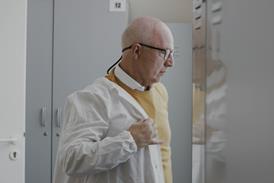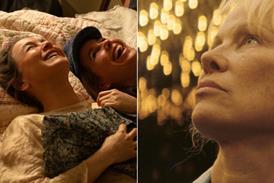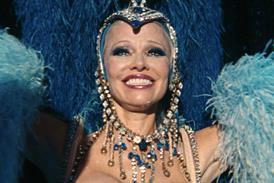Dir: Adrian Shergold. UK.2005. 90mins.
A TV movie in every respect, The Last Hangman should enjoy a highly appreciative reception inits normal habitat, but is unlikely to hold the interest of theatrical audiencesfor all of its 90 minutes.
The true story of Albert Pierrepoint, the last hangman in UK before capitalpunishment was abolished in the 1960s, it containsjust the kind of solid, trustworthy elements that British TV has always excelledat.
But its treatment of whatcould be considered by some as a macabre and morbid subject is, despite someexcellent turns from Timothy Spall and JulietStevenson, too pedestrian.
Theatrical prospects seem asgloomy as its subject, with full redemption to be achieved on television.
The life story of Albert Pierrepoint (Spall) is prettystraightforward. The son of a hangman, he applies for the same job as his dad, despitehis mother's warnings that it will destroy him as it did his father.
Once accepted, he plies histrade with dedication and distinction for the next 20 years, leading the lifeof a typical civil servant. There is only one difference: instead of fillingforms and sending letters, Pierrepoint travels aroundthe country, placing the noose around the neck of the condemned and ensuringthat the executions are neat, proper and irreproachable.
All Pierrepointwants to know about the convicts he deals with are their height, weight andphysical conditions. He does not hate them and he does not like them; all hewants to do is get the job done as quickly and as painlessly as possibly. Therest is not up to him; God has nothing to do with it, nor does his conscience.
Pierrepoint never tells his wife (Stevenson) about hisprofession but she soon finds out for herself from a ledger where Albertmeticulously notes name, place and date of every execution so he can correctly billthe government for his services. She never complains nor discusses the matter,firmly believing that his work is not something to talk about at home.
The highpoint of Pierrepoint's career comes at the end of World War Two,when Field Marshall Montgomery invites him to travel to Germany and assumeresponsibility for the execution of the Nazi war criminals condemned at theNuremberg trials.
The experience provestraumatic even for Pierrepoint, for he has never hadto dispatch so many prisoners in such a short time. Once back home he isinitially acclaimed by the crowds when his identity as the nation's hangman is revealedfor the first time, but also begins to perceive the grisly nature of his work.
He is further shocked whenhe has to hang his pal (Eddie Marsan) after the manis condemned to death for killing his girlfriend and attacked by theabolitionists who call him a murderer. He tends his resignation after theexecution in 1955 of Ruth Ellis, the last woman executed in the UK (capitalpunishment continued until 1964).
The point made by JeffPope's script and Adrian Shergold's direction isevident, namely that Pierrepoint is a product ofmiddle-class double standards, which allow one to bend their morals in order totake another man's life if required.
Pierrepoint never doubts the fact that he is a decent person,doing a decent job, and his ambition is to be the best in his line of businessby mastering all its details and intricacies . Neverdoes he recognise the atrocious absurdity of his approach.
But Pierrepoint'slife is too sedate and unexceptional in its routines - with the exception ofthe increasingly routine executions themselves (he performed over 600 duringhis career) - to justify a full length drama.
The contrast between his lifestyleand his occupation is one of the main issues at the heart of
Timothy Spallgives a remarkable performance, playing Albert as a chilling yet at the sametime humane, person with who audiences can sympathise, if not really like.
Julia Stevenson is perfectas the practical wife who shuts herself off from anything she feels she cannothandle, while Marsan, as the hopelessly doomed lover,is a sacrificial lamb whose demise shakes Albert from his self-willed morallethargy.
Effectively shot and brisklyedited, the smooth professional touch of a top class TV production is evidentthroughout, and with a bit more editing might have delivered a sharper punch.
But for the moral aspects ofthis gruesome profession one is advised to look instead towards Errol Morris andhis hallucinatory documentary Mr Death, The Rise And Fall Of Fred A LeuchterJr.
Production companies
Granada
International sales
Capitol Films
Executive producers
Andy Harris
Jeff Pope
Producers
Christine Langan
Screenplay
Jeff Pope
Cinematography
Danny Cohen
Editor
Tania Reddin
Production design
Candida Otton
Music
Martin Phipps
Main cast
Timothy Spall
Juliet Stevenson
Eddie Marsan



















No comments yet